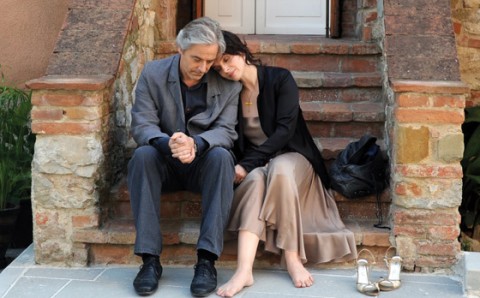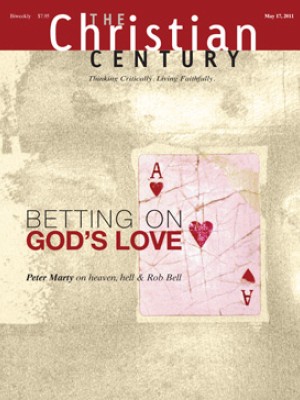Certified Copy

Certified Copy, the first English-language film by the Iranian writer-director Abbas Kiarostami, is a road-trip meditation on the complexities of marriage. Like almost all the work by this 71-year-old icon of the international film festival circuit, it reveals itself slowly, keeping us hanging and distracted for the entire first act before the key issues are laid bare.
The tale plays out in Tuscany and centers on a transplanted antiques dealer named Elle (French star Juliette Binoche, whose performance won the Best Actress Award at the 2010 Cannes Film Festival). When we first meet her, she is attending a lecture and book signing by visiting writer James Miller (opera singer William Shimell, in his first film role). Miller's latest book, Certified Copy, is about distinguishing copies from originals. Though the book ostensibly deals with issues of art, it becomes clear through his lecture and his later dialogue that he feels the same rules apply to the dreams and ambitions of individuals.
Read our latest issue or browse back issues.
Elle seems mesmerized by the tall, silver-haired speaker, but thanks to the whining of her hungry ten-year-old son, she must leave the lecture before it ends. But a quickly written invitation brings them together after all. Though the meeting is supposedly for the purpose of discussing the issue of artistic "copies" that she has in her own store, the two are soon driving to a place that Elle knows well—for strong coffee and light flirting.
Kiarostami's love for automobiles and the revealing conversations that take place on car journeys is legendary in the world of cinema. Though clearly attracted to each other, James and Elle are both strong willed and opinionated, and their discussions about art, artifice and the way they mesh and clash are fascinating in an art-house sort of way. But it isn't until they reach the small café and James goes outside to answer a cell-phone call that the story pulls back its veil (spoiler alert).
In one of the more beautiful and profound film scenes you are likely to see this year, Elle starts a conversation with the owner of the café, an older woman. The owner has clearly assumed that Elle and James are a married couple. Elle doesn't correct her, instead going along with her as they discuss the roles of husbands and wives, especially couples who have been married for many years. This dialogue, as simple as it is, immediately shifts the movie into a different gear, for as soon as James returns from his phone call, the true nature of their relationship is brought into question. The way they speak and relate and bicker and sigh no longer suggests people meeting for the first time, but rather a married couple having trouble recapturing the love and romance of their original union.
Suddenly the town becomes a nicely lit symbol of both marital bliss and marital frustration as they encounter couples about to be married, an old hotel Elle remembers from their early days together, even a statue in the center of the village that speaks to the warmth and safety of companionship.
Those seeking a logical explanation for the film's transformation will be disappointed. Kiarostami doesn't seem interested in explaining what the real relationship is—any more than he is in taking sides in the argument over the value of originals versus copies.
What he does seem to be suggesting—with help from the enormous acting chops of the actress the French refer to as "La Binoche"—is that over time, even the loveliest and most compassionate face loses its luster, becoming almost a shadowy copy of the luminous original. Think of this face as the face of marriage, and the method behind Kiarostami's narrative madness becomes apparent. Certified Copy's story may be difficult to discern with the naked eye, but its message rings as clear as a church-tower bell in the dusty glow of Tuscany.





